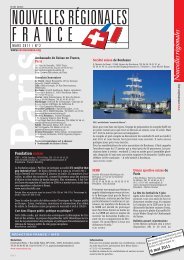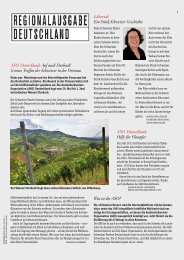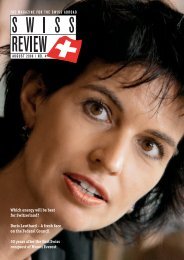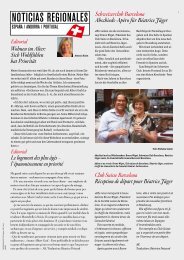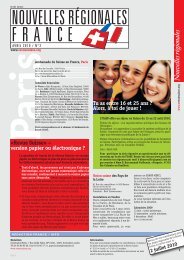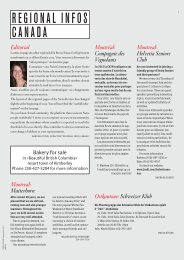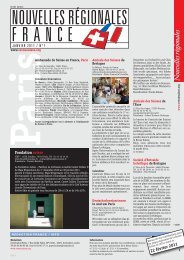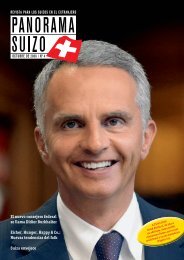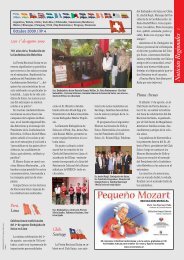Download PDF Swiss Review 6/2012 Low ... - Schweizer Revue
Download PDF Swiss Review 6/2012 Low ... - Schweizer Revue
Download PDF Swiss Review 6/2012 Low ... - Schweizer Revue
Create successful ePaper yourself
Turn your PDF publications into a flip-book with our unique Google optimized e-Paper software.
SWISS REVIEW December <strong>2012</strong> / No. 6<br />
20 POLITICS<br />
Initiatives against fat-cat pay and urban sprawl<br />
and in favour of the family<br />
Two fi ercely debated issues will be decided at referendum in March – excessive management salaries<br />
and the protection of undeveloped countryside. The <strong>Swiss</strong> people and cantons will also vote on enshrining<br />
an article on families in the federal constitution.<br />
By René Lenzin<br />
The people will now have the fi nal say – how<br />
are excessive management salaries and enormous<br />
bonuses to be curbed? With the “fat cat”<br />
initiative launched by Thomas Minder, the<br />
Schaffhausen businessman and Council of<br />
States member, or with the indirect counterproposal<br />
put forward by the Federal Council<br />
and Parliament? If the people and cantons<br />
approve the initiative on 3 March, Parliament<br />
will then have to draw up applicable legislation.<br />
If it is rejected, the already adopted<br />
counterproposal will enter into force. Both<br />
proposals aim to strengthen shareholder<br />
rights and to subject the management of large<br />
listed companies to more stringent controls.<br />
The counterproposal gives companies more<br />
room for manoeuvre in relation to severance<br />
pay and the third-party mandates of members<br />
of the Board of Directors and management<br />
(see also “<strong>Swiss</strong> <strong>Review</strong>” 4/<strong>2012</strong>).<br />
Thomas Minder has stood by his initiative because<br />
he says the counterproposal only takes<br />
account of 40 % of his demands. In contrast,<br />
opponents of the initiative claim 80 % are incorporated.<br />
The National Council recommended<br />
the rejection of the initiative, as did<br />
the Council of States. Left-wing and green<br />
Members of Parliament support the initiative,<br />
while most conservatives are opposed to<br />
it. Industry associations are also against it.<br />
Protection of the countryside<br />
Spatial planning and urban sprawl have become<br />
increasingly important issues in recent<br />
TAX AGREEMENTS – IMPORTANT INFORMATION<br />
<strong>Swiss</strong> citizens abroad in Germany, Austria and the UK must decide<br />
how their banks are to act vis-à-vis the tax authorities in future in<br />
view of the tax agreements between these countries and Switzerland.<br />
The banks are currently sending clients abroad the respective forms<br />
with mandates. It is important that these forms are completed and returned<br />
to the banks. Otherwise, the banks will calculate the withholding<br />
tax on the relevant capital and debit it from the account directly.<br />
The fi nal deadline for notifi cation according to the agreements<br />
is 31 May 2013 and not 14 December <strong>2012</strong> as communicated by some<br />
banks. Further information is available at<br />
www.sif.admin.ch<br />
years. The growing sensitivity shown by the<br />
<strong>Swiss</strong> people towards protection of the countryside<br />
was refl ected in the approval of the<br />
proposal restricting second homes in the referendum<br />
held on 11 March <strong>2012</strong>. The countryside<br />
initiative submitted in August 2008,<br />
which calls for a 20-year ban on new development<br />
zones, is along similar lines. Having<br />
taken heed of the success of the second<br />
homes initiative, the Federal Council and<br />
Parliament have decided to oppose the countryside<br />
initiative with a robust counterproposal.<br />
Its aim is to curb urban sprawl and<br />
protect precious farmland better.<br />
In specifi c terms, the proposed amendment<br />
to the spatial planning law provides<br />
that communes shall only have access to as<br />
much development land as they require for<br />
the coming 15 years. Excessive development<br />
zones are to be reduced. The proposal’s key<br />
element is the so-called added value tax. The<br />
owners of newly categorised development<br />
land must in future pay 20 % of the added<br />
value to the state when the land is sold or developed.<br />
These revenues are to be used by<br />
the state to compensate landowners whose<br />
land is excluded from development zones<br />
and which loses value as a result.<br />
The National Council fi nally approved the<br />
proposal by 108 votes to 77 and the Council<br />
of States by 30 votes to 10. The Social Democrats,<br />
Greens, Green Liberals and the majority<br />
of Christian Democrats voted in favour<br />
of it. It was opposed by the Free<br />
LAW ON EPIZOOTIC DISEASES APPROVED<br />
Democrat-Liberals and the <strong>Swiss</strong> People’s<br />
Party. The <strong>Swiss</strong> people must now decide after<br />
the <strong>Swiss</strong> Chamber of Commerce successfully<br />
called a referendum. If they approve<br />
the new law, the countryside initiative<br />
will be withdrawn.<br />
Article on family policy<br />
A broad consensus exists among politicians<br />
that families should be strengthened and<br />
promoted. How this objective should be<br />
achieved, nevertheless, remains contentious.<br />
A centre-left parliamentary majority has now<br />
pushed through a proposal for an article on<br />
family policy to be enshrined in the federal<br />
constitution. This would require federal government<br />
“to take account of the needs of<br />
families when performing its duties”. Together<br />
with the cantons, it would also have<br />
to “promote balance between family and<br />
work or education”. The cantons would have<br />
to ensure a “needs-led provision of day-care<br />
facilities for families to complement schools”,<br />
as set out in the new article 115a. The proposal<br />
has come from the ranks of the Christian<br />
Democrats. The National Council approved<br />
the article by 129 votes to 57 and the<br />
Council of States by 28 votes to 12. As this<br />
involves a constitutional amendment, the<br />
majority support of the <strong>Swiss</strong> people and<br />
cantons at referendum is mandatory<br />
RENÉ LENZIN is an editor at “<strong>Swiss</strong> <strong>Review</strong>”<br />
68.3 % of the electorate and 24 out of 26 cantons approved the revised<br />
law on epizootic diseases on 25 November. This gives federal<br />
government greater powers to prevent such diseases. The cantons remain<br />
responsible for fi ghting epizootic diseases, but federal government<br />
can take and fund preventive measures. Only the cantons of Appenzell<br />
Innerrhoden and Uri rejected the law. The proposal was<br />
accepted by a narrow margin in the other cantons of central and eastern<br />
Switzerland. The larger cantons and French-speaking Switzerland<br />
overwhelmingly supported the law. The turnout of 27 %, the second<br />
lowest since the introduction of the right to vote for women in 1971,<br />
highlights the low level of interest in the proposal. (RL)



